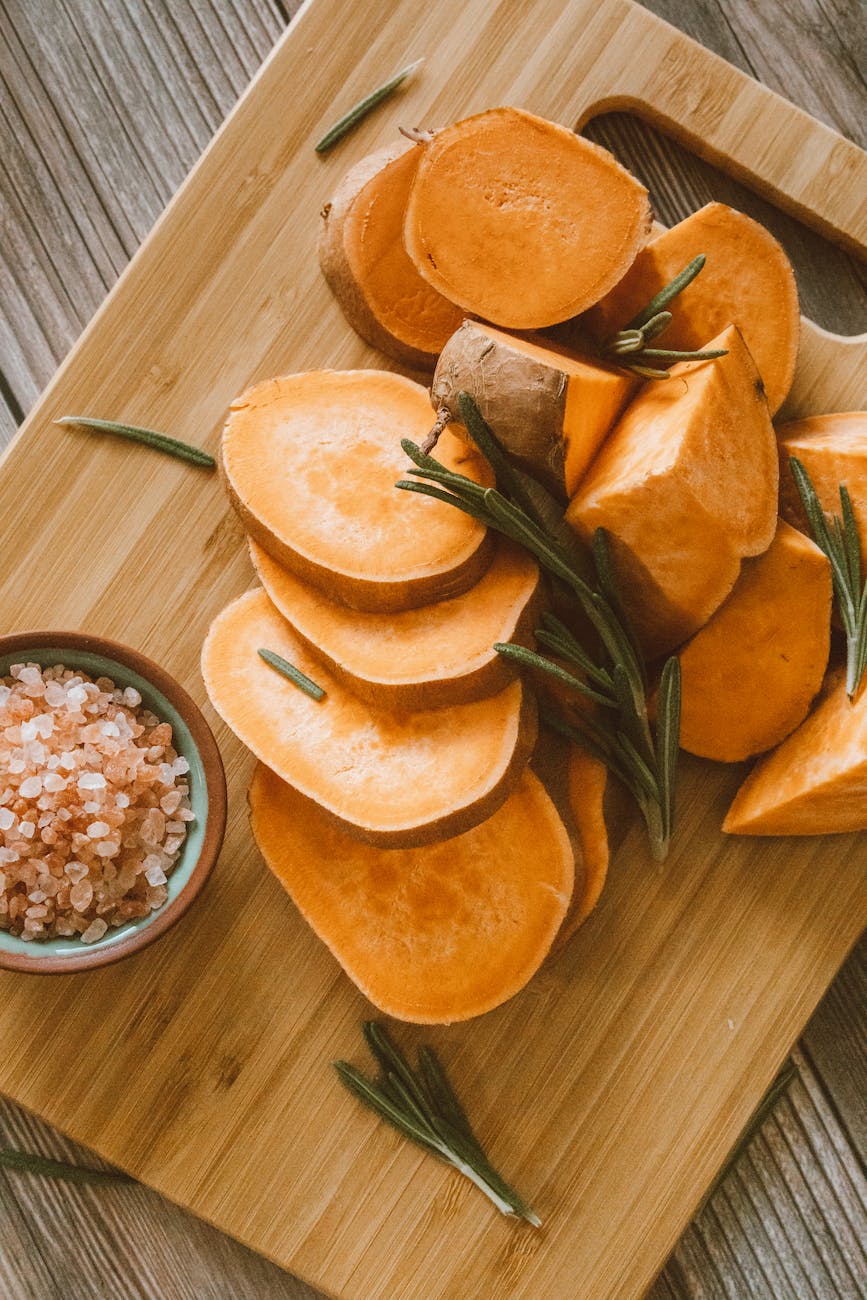
Introduction
Welcome to a journey through the vibrant world of sweet potatoes – a humble yet mighty tuber that packs a nutritional punch. In this comprehensive guide, “Sweet Potato: Benefits & Nutritional Breakdown,” we’ll peel back the layers to uncover the rich tapestry of health benefits and nutritional wealth that sweet potatoes offer. Often overshadowed by their starchy counterparts, sweet potatoes are a treasure trove of vitamins, minerals, and antioxidants, making them a powerhouse food for all.
From supporting digestive health to boosting brain function, and from stabilizing blood sugar to fighting off diseases, sweet potatoes are more than just a delicious side dish; they’re a key ingredient in a health-conscious lifestyle. Whether you’re a fitness enthusiast, a health-conscious parent, or simply someone looking to make more informed dietary choices, this guide will provide you with a deep dive into the sweet potato’s nutritional profile, practical tips on how to incorporate it into your daily meals, and the science-backed benefits that make it a superfood.
So, grab a sweet potato, get comfortable, and let’s embark on this flavorful and informative adventure. Prepare to be surprised and inspired as we explore the myriad ways this vibrant root can enhance your health and tantalize your taste buds.
Sweet Potato: A Nutritional Powerhouse
Did you know that sweet potatoes aren’t just for Thanksgiving feasts or as a side to your main course? These brightly colored roots are nutritional superheroes, silently working wonders for your health with every bite. In this section, we will unveil the rich nutritional profile of sweet potatoes and why they deserve a regular spot on your plate.
A Symphony of Nutrients
Sweet potatoes are a confluence of essential nutrients. Let’s break down what a typical 100g serving of this root vegetable contains:
- Calories and Macronutrients: With only about 90 calories per 100g, sweet potatoes are a guilt-free addition to your diet. They offer a balance of 21g carbohydrates, 2g protein, and minimal fat, making them an ideal energy source for active lifestyles.
- Vitamins Galore: They are a goldmine of vitamins, particularly high in Vitamin A (providing a whopping 438% of your daily value), Vitamin C, and B vitamins. These vitamins play a pivotal role in vision, immunity, and energy production.
- Mineral Rich: Sweet potatoes are also abundant in vital minerals like manganese, potassium, and magnesium – essential for bone health, cardiovascular health, and stress management.
More Than Just Carbs
Often misjudged as ‘just another starchy vegetable,’ sweet potatoes break the stereotype with their unique health benefits:
- Digestive Health: The high fiber content aids in digestion and regularity, while also playing a role in weight management.
- Blood Sugar Regulation: Despite their sweetness, sweet potatoes have a low glycemic index, assisting in blood sugar control, making them suitable for diabetics.
- Antioxidant Powerhouse: They are rich in antioxidants, particularly beta-carotene and anthocyanins, which combat oxidative stress and inflammation in the body.
Versatile and Delicious
Beyond their health benefits, sweet potatoes are culinary chameleons. Whether baked, boiled, roasted, or mashed, they bring a natural sweetness and richness to any dish. In the upcoming sections, we will explore creative and delicious ways to incorporate sweet potatoes into your daily meals.
Stay tuned as we delve deeper into the specific health benefits of sweet potatoes and how they can be your ally in wellness and taste.
10 Health Benefits of Sweet Potatoes
Now that we’ve explored the nutritional richness of sweet potatoes, let’s dive into the specific health benefits that make them a must-have in your diet. Each benefit is backed by science, providing you with more than just a reason to enjoy their sweet taste – but a reason to appreciate their impact on your health.
1. Champion for Your Heart
Sweet potatoes are a heart’s best friend. The high fiber content helps in reducing LDL (bad) cholesterol levels, and the potassium content aids in regulating blood pressure. These factors collectively contribute to a healthier cardiovascular system.
2. Visionary Root Vegetables
Rich in beta-carotene, which the body converts to Vitamin A, sweet potatoes are essential for maintaining healthy eyesight. The presence of other carotenoids like lutein and zeaxanthin further protects against age-related vision decline.
3. Immune System Booster
Packed with Vitamin C and other antioxidants, sweet potatoes strengthen your immune system. Regular consumption can help ward off infections and diseases, keeping you healthier all year round.
4. Brain Fuel
Sweet potatoes contain nutrients like choline and manganese, which are vital for brain health. These components aid in neurotransmitter function and cognitive processing, making sweet potatoes a smart choice for maintaining brain health.
5. Anti-Cancer Potential
The unique proteins in sweet potatoes, such as sporamin, have shown potential in inhibiting cancer cell growth. Additionally, the high antioxidant content helps in reducing the risk of various cancers.
6. Stress and Anxiety Reliever
Magnesium, found in sweet potatoes, is known for its ability to help alleviate stress and anxiety. Including sweet potatoes in your diet can contribute to a calmer and more relaxed state of mind.
7. Blood Sugar Regulator
Despite their natural sweetness, sweet potatoes have a low glycemic index. This means they provide a slow and steady release of energy, helping in managing blood sugar levels effectively.
8. Inflammation Fighter
The anti-inflammatory properties of sweet potatoes are beneficial in reducing inflammation throughout the body, particularly in conditions like arthritis.
9. Weight Management Ally
High in fiber and water content, sweet potatoes promote a feeling of fullness and can be an effective part of a weight management diet.
10. Skin and Hair Health
The vitamins and minerals in sweet potatoes, especially Vitamin A and C, are great for maintaining healthy skin and hair, giving you a natural glow.
Sweet Potatoes in the Kitchen: Culinary Delights and Tips
After discovering the myriad health benefits of sweet potatoes, you might be wondering how to incorporate them into your daily meals. Fear not! Sweet potatoes are not only nutritious but also incredibly versatile in the kitchen. Here, we will share some culinary tips and mouth-watering recipes that make sweet potatoes the star of any meal.
Culinary Tips:
- Keep the Skin On: Much of the fiber and nutrients are in the skin. So, whether you’re baking, roasting, or mashing them, try to keep the skin on to maximize the health benefits.
- Cooking Methods Matter: Baking or boiling sweet potatoes can help retain most of their nutrients. Avoid deep-frying to keep them as healthy as possible.
- Spice It Up: Sweet potatoes pair wonderfully with a range of spices – from cinnamon and nutmeg for a sweet dish to paprika and cumin for something savory.
- Sweet and Savory Balance: Experiment with combining sweet potatoes with both sweet and savory ingredients. Their natural sweetness complements a variety of flavors.
Delicious Recipes to Try:
- Hearty Sweet Potato Soup: Blend boiled sweet potatoes with vegetable stock, onions, and garlic for a comforting and nutritious soup.
- Roasted Sweet Potato Wedges: Cut sweet potatoes into wedges, toss with olive oil, salt, pepper, and your favorite herbs, and roast until crispy.
- Sweet Potato and Black Bean Tacos: Use mashed sweet potatoes as a filling for tacos, topped with black beans, avocado, and a squeeze of lime for a healthy twist on taco night.
- Sweet Potato Breakfast Bowls: Top baked sweet potato halves with yogurt, nuts, seeds, and a drizzle of honey for a nutritious start to your day.
- Sweet Potato and Chickpea Curry: Combine sweet potatoes with chickpeas, coconut milk, and curry spices for a hearty and flavorful vegan meal.
Sweet Potatoes for Every Meal
Whether you’re looking for a warming breakfast, a nourishing lunch, a satisfying dinner, or even a healthy snack, sweet potatoes are a fantastic option. Their versatility makes them easy to incorporate into a variety of dishes, ensuring you reap their health benefits in every bite.
Certainly! Here’s a section that you can use in all three of your blog posts, which effectively interlinks them and provides a cohesive narrative across the different topics:
Exploring the Versatility of Sweet Potatoes: A Journey Through Nutrition, Keto Compatibility, and Weight Loss Benefits
Sweet potatoes, a vibrant and nutrient-rich vegetable, present a fascinating subject for anyone interested in health and nutrition. In our comprehensive series on sweet potatoes, we delve into various aspects of this versatile tuber, exploring its role in different dietary contexts.
In “The Truth About Sweet Potatoes on the Keto Diet: Can You Indulge and Stay in Ketosis?,” we unravel the complex relationship between sweet potatoes and the ketogenic diet. This post examines whether the carb content of sweet potatoes aligns with the strict macros of a keto diet and how they can be included without disrupting ketosis.
Shifting focus to the broader nutritional landscape, “Sweet Potato Benefits: Nutritional Breakdown” offers an in-depth look at the nutritional powerhouse that sweet potatoes are. This piece provides valuable insights into the vitamins, minerals, and fiber content of sweet potatoes, underscoring their importance in a balanced diet.
Finally, in “Benefits of Sweet Potatoes for Weight Loss,” we explore how sweet potatoes can be an effective part of a weight loss diet. The article discusses how the high fiber content and low glycemic index of sweet potatoes contribute to weight management and overall well-being.
Each of these posts offers unique perspectives on sweet potatoes, highlighting their multifaceted role in nutrition, ketogenic dieting, and weight loss. We invite you to read through each article to gain a comprehensive understanding of how sweet potatoes can fit into various dietary plans and contribute to a healthier lifestyle.
Sweet Potatoes: Your Questions Answered
- Are sweet potatoes better than regular potatoes? Sweet potatoes and regular potatoes offer different nutritional profiles. Sweet potatoes have higher fiber content and are rich in vitamins A and C. They’re a healthier choice for those looking to manage blood sugar levels due to their lower glycemic index.
- Can sweet potatoes be a part of a weight loss diet? Absolutely! High in fiber and water content, sweet potatoes can help you feel full longer. Their nutrient density also ensures you’re getting essential vitamins and minerals while cutting calories.
- How do you store sweet potatoes to keep them fresh? Store sweet potatoes in a cool, dry place away from sunlight. Avoid refrigerating them as this can alter their taste and texture.
- Are sweet potatoes suitable for diabetics? Yes, due to their low glycemic index, sweet potatoes release sugar into the bloodstream slowly, preventing blood sugar spikes.
- Can I eat sweet potatoes if I have a gluten intolerance? Sweet potatoes are naturally gluten-free, making them a great option for those with gluten sensitivities or celiac disease.
Wrapping It Up
Sweet potatoes are more than just a delicious addition to your meals; they’re a nutritional powerhouse that can boost your health in numerous ways. From supporting heart health to fighting cancer, their benefits are as vast as they are vital. By incorporating sweet potatoes into your diet, you’re not just enjoying a tasty vegetable; you’re investing in your long-term health.
As we conclude this guide, we hope you’re inspired to explore the versatility of sweet potatoes in your culinary adventures. Don’t forget to experiment with the recipes we’ve shared and make sweet potatoes a regular part of your healthy eating habits.
Remember, the journey to good health can be as delicious as it is nutritious – and sweet potatoes are here to prove just that!










